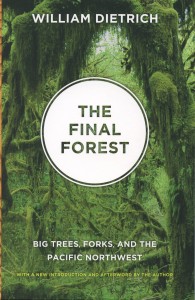The Final Forest Q&A
 Q: Your first non-fiction book was nearly two decades old when University of Washington Press reissued it in November of 2010. Why is it back?
Q: Your first non-fiction book was nearly two decades old when University of Washington Press reissued it in November of 2010. Why is it back?
A: The Final Forest enjoyed a long press run with Simon & Schuster and then Penguin, and was widely used for college classrooms as an environmental and sociological look at the Northwest timber controversy. When it finally went out of print in 2008, I was contacted by educators who were frustrated they could not longer get it. At the same time, I realized the Twilight series of vampire novels had made the setting of the book, Forks, WA, internationally famous, with more than 100 million copies in print. And, I was curious what had happened to the loggers, scientists, and environmentalists I profiled in the book.
Q: What’s different about the new edition?
A: A new preface and afterword. The preface discusses the Twilight phenomenon and how it and other economic and cultural changes have changed Forks over the past 20 years. The afterword updates the story on what has happened to Northwest and global forests and has a postscript update on many of the people in the book.
Q: Did you go back to Forks?
A: Yes. In many ways the same town - physical change is slow - and in many ways different, with a huge decline in logging activity and new stores devoted to nothing but Twilight souvenirs. It’s bizarre to compare. Real life is very strange.
Q: Has the timber issue been resolved?
A: Of course not; we’ll be arguing about trees for as long as civilization persists. There has been a dramatic decline in old growth logging, new wood sales to Asia, mechanization of the logging industry, globalization of wood supply, and many other changes. What is the identity of rural American timber towns in the 21st Century? That is the challenge Forks faces. Will it ever again be ‘The Logging Capital of the World’? Or the tree capital?
Q: Where are forestry issues going?
A: We’ve got a limping economy, 7 billion people demanding resources, climate change, and a real mix of environmental success stories and failures, of specie comebacks and extinctions. The spotted owl is still in trouble. I think the issue is less polarized than it was in 1990, and that serious thinkers on both sides are searching for ways to create a sustainable forest economy that includes careful resource use and environmental protection that encourages a tourism and recreational economy. For all our problems I think we’ve come a long ways and can find solutions, but only if we don’t let today’s extreme partisanship derail common sense compromise.

